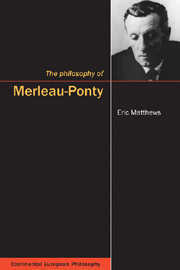2 - Phenomenology
Summary
Many philosophers influenced the direction of Merleau-Ponty's thinking, as was shown in Chapter 1, but the single most significant influence was that of Edmund Husserl (1859–1938) and the “phenomenological” school that he founded. If we are to understand Merleau-Ponty properly, we have to see him above all in relation to phenomenology. At least in his major works, he certainly saw himself as a phenomenologist, and even the other influences on his thought were filtered through his conception of phenomenology. And, clearly, if we are to understand Merleau-Ponty's relationship to Husserlian phenomenology, we must first say something about Husserl's own thought. As stated in Chapter 1, Merleau-Ponty first discovered Husserl's philosophy while still a student at the École Normale Supérieure, where he attended Georges Gurvitch's lectures on contemporary German philosophy and also the lectures given by Husserl himself at the Sorbonne in 1929, later published as Cartesian Meditations. But the version of phenomenology that had most influence on his own work was not that of this earlier phase of Husserl's life, but that on which Husserl was working in the last years of his life. An article about these developments in the Revue internationale de philosophie in 1939 aroused Merleau-Ponty's interest and inspired him to go to the newly established Husserl Archive at the University of Louvain in Belgium and to read avidly in the Husserl papers that were kept there (he was, in fact, one of the very first visitors to the archive).
- Type
- Chapter
- Information
- The Philosophy of Merleau-Ponty , pp. 23 - 44Publisher: Acumen PublishingPrint publication year: 2002

